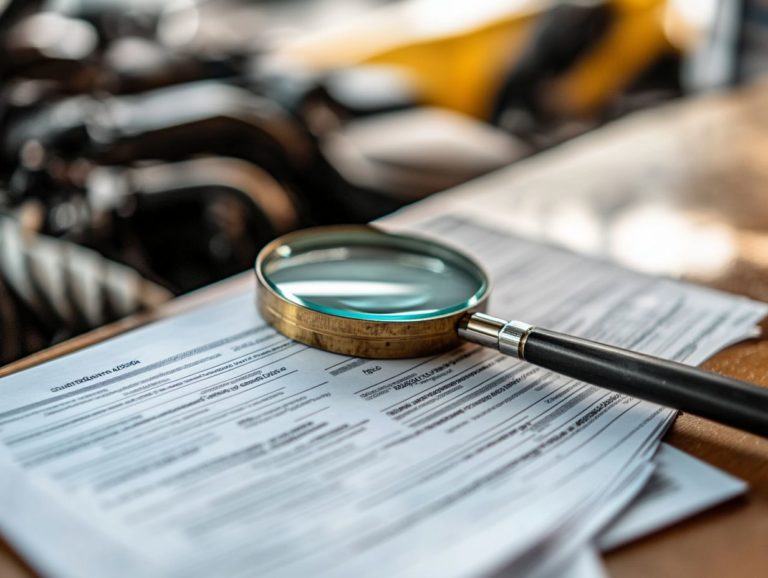What’s Covered Under Manufacturer Warranties?
When you purchase a product, understanding the details of manufacturer warranties can save you both time and money.
This article explores what a manufacturer warranty is, the various types available, and what they typically cover. It guides you through the claims process and offers valuable tips to help you maximize your warranty coverage.
Whether you’re a seasoned shopper or on your first buying journey, this information equips you to make informed decisions and protect your investments.
Contents
- Key Takeaways:
- Understanding Manufacturer Warranties
- Types of Manufacturer Warranties
- What is Covered Under a Manufacturer Warranty?
- How to Make a Claim on a Manufacturer Warranty
- Tips for Maximizing Manufacturer Warranty Coverage
- Frequently Asked Questions
- What s Covered Under Manufacturer Warranties?
- What types of products are usually covered under manufacturer warranties?
- Are accidental damages covered under manufacturer warranties?
- How long do manufacturer warranties usually last?
- Do I need to register my product to be eligible for the manufacturer warranty?
- What should I do if I need to use my manufacturer warranty?
Key Takeaways:

- Manufacturer warranties cover defects and malfunctions in a product for a specific period after purchase.
- Common inclusions in manufacturer warranties cover parts and labor costs, while exclusions may include accidental damage and normal wear and tear.
- To make a claim on a manufacturer warranty, follow the step-by-step process outlined by the manufacturer and keep the warranty valid by properly maintaining the product.
Understanding Manufacturer Warranties
Understanding the nuances of manufacturer warranties is essential for every vehicle owner as you navigate the complex world of car ownership.
A manufacturer warranty is a straightforward promise from automakers to cover repairs and replacements for defects in factory-installed parts for a set duration. These warranties typically offer coverage options that protect you from mechanical breakdowns when your vehicle stops working properly and repair costs, letting you drive confidently.
By fully grasping these warranties, you empower yourself to make informed choices and select the right vehicle warranty tailored to your unique needs.
What is a Manufacturer Warranty?
A manufacturer warranty is a written promise from car manufacturers, ensuring coverage for specific repairs and replacements within a defined timeframe.
This warranty is your safety net as a car buyer. It guarantees that any defects in materials or workmanship will be fixed at no cost to you, as long as you stay within the terms of the policy. Typically, these warranties last for a few years or are tied to a specific mileage limit, depending on the manufacturer.
For instance, Honda might offer a three-year or 36,000-mile warranty, while Toyota often has similar terms. In contrast, Ford frequently includes coverage for the first five years or 60,000 miles, showcasing its commitment to customer satisfaction.
By knowing the details of these warranties, you can make informed decisions and ensure you select a vehicle that perfectly aligns with your needs.
Types of Manufacturer Warranties
When you explore the different types of manufacturer warranties, it’s crucial to understand the differences between limited warranties and extended warranties. Each serves a unique purpose in protecting your vehicle.
Limited vs. Extended Warranties

Limited warranties typically offer shorter coverage for specific vehicle components, while extended warranties provide broader protection for a longer period.
For example, a limited warranty might cover essential parts like the powertrain or electrical systems for just three years or 36,000 miles. In contrast, an extended warranty often includes a wider range of critical parts, such as the suspension, cooling system, and even roadside assistance, extending coverage up to 100,000 miles or more.
Imagine discovering that your limited warranty excludes basic wear-and-tear items like brake pads. An extended warranty, however, could include those components, giving you priceless peace of mind.
Knowing these distinctions allows you to choose the right level of protection tailored specifically to your needs.
What is Covered Under a Manufacturer Warranty?
A manufacturer warranty typically protects essential vehicle components, covering factory-installed parts and certain systems. However, it s vital to be aware of the significant exclusions that may apply, as understanding these details can spare you from unexpected surprises later.
Now that you know the ins and outs of manufacturer warranties, you can shop with confidence!
Common Inclusions and Exclusions
Common inclusions under a manufacturer warranty generally cover repair costs for mechanical failures. Exclusions often involve routine maintenance and damage resulting from misuse.
For instance, if you encounter engine trouble due to a faulty part, the warranty is likely to handle those repair expenses, sparing you from unexpected financial burdens. However, routine services like oil changes, tire rotations, and brake pad replacements are typically excluded, leaving those responsibilities squarely on your shoulders.
Damage from accidents or negligence such as driving over curbs or ignoring warning lights usually falls outside the warranty coverage.
Understanding these inclusions and exclusions is crucial. Any misunderstandings can lead to significant out-of-pocket expenses, ultimately influencing your overall cost of vehicle ownership and maintenance.
How to Make a Claim on a Manufacturer Warranty
Making a claim on a manufacturer warranty requires a clear understanding of the claims process, which can differ significantly from one manufacturer to another. This process often demands specific documentation and effective communication with approved repair shops.
Being thorough in your preparation will ensure a smoother experience.
Step-by-Step Process

The process for filing a warranty claim typically begins with a careful review of the warranty terms. Next, contact the approved repair shop.
This initial review is vital, as it helps you familiarize yourself with coverage details, exclusions, and the required documentation. Reaching out to the repair shop allows you to grasp their specific procedures, paving the way for a smoother experience.
Clearly communicating the issue at hand is essential. Having relevant documents ready like purchase receipts or prior maintenance records will serve you well.
Document each interaction thoroughly; note down names, dates, and the specifics of conversations. Once the repair shop has assessed the issue, they will guide you through the necessary steps toward finalization.
Knowing each step and working closely with trusted professionals is essential.
Tips for Maximizing Manufacturer Warranty Coverage
Maximizing your manufacturer warranty coverage necessitates a committed approach to routine maintenance services, alongside a clear understanding of the warranty guarantees. Staying diligent is key to protecting your vehicle.
How to Keep Your Warranty Valid
To keep your manufacturer warranty intact, it s crucial for you to adhere to routine maintenance guidelines outlined in the warranty terms. This means following the recommended service schedule, which typically includes regular oil changes, tire rotations, and brake inspections.
As a vehicle owner, ensure that any maintenance performed is thoroughly documented. These records serve as essential proof that you ve maintained your vehicle according to the manufacturer s specifications.
Keeping a detailed log not only protects you from warranty disputes but also helps sustain your vehicle’s performance and enhances its resale value.
Investing time in routine checks and meticulous record-keeping is a wise practice for any responsible owner.
Negotiating for Additional Coverage
Negotiating for additional coverage in your manufacturer warranty can greatly improve your peace of mind. It ensures you are protected against unexpected repair costs.
Talk to auto dealers about their extended coverage options. You can find various warranty plans that meet your specific needs.
Reviewing customer feedback offers valuable insights. This helps you assess the reliability and value of available warranties.
Frequently Asked Questions

What s Covered Under Manufacturer Warranties?
Manufacturer warranties cover defects in materials and workmanship. If your product breaks due to a manufacturing fault, the warranty applies.
What types of products are usually covered under manufacturer warranties?
- Electronics
- Appliances
- Vehicles
Most products have some form of manufacturer warranty. Be sure to check each warranty’s specific terms and conditions.
Are accidental damages covered under manufacturer warranties?
Accidental damages are not typically covered under manufacturer warranties. These damages are usually covered by separate insurance policies or extended warranties.
How long do manufacturer warranties usually last?
The length of a manufacturer warranty varies. Most are valid for 1-2 years from the date of purchase, but some may offer longer coverage or the option for extended coverage.
Do I need to register my product to be eligible for the manufacturer warranty?
In some cases, yes. Some manufacturers require product registration to activate the warranty. Don t miss out on your warranty benefits! Register your product right away!
What should I do if I need to use my manufacturer warranty?
If your product malfunctions and is covered by the warranty, contact the manufacturer or retailer where you purchased it. They will guide you on how to file a claim for a repair or replacement.





